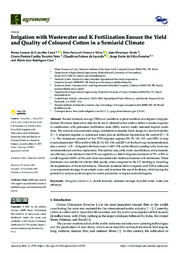Irrigation with wastewater and K fertilization ensure the yield and quality of coloured cotton in a semiarid climate.
Irrigation with wastewater and K fertilization ensure the yield and quality of coloured cotton in a semiarid climate.
Author(s): LIMA, B. L. de C.; SILVA, Ê. F. de F. e; ZONTA, J. H.; CORDÃO TERCEIRO NETO, C. P.; LACERDA, C. F. de; FERREIRA, J. F. da S.; CRUZ, F. J. R.
Summary: Treated domestic sewage (TDS) can contribute to plant nutrition and improve crop production. However, there are no data for its use in coloured cotton under a deficit or excess irrigation in combination with potassium fertilization rates (KRs), mainly under semiarid tropical conditions. The research was conducted using a randomized complete block design in a factorial scheme (5 × 5, irrigation regimes vs. potassium rates), plus an additional treatment as the control ((5 × 5) + 1). The treatments consisted of five TDS irrigation regimes (50, 75, 100, 125, and 150% of crop evapotranspiration?ETc) and five KRs (0, 50, 100, 150, and 200% of the local crop recommendation), plus a control?CT? (irrigated with fresh water at 100% ETc and fertilized according to the local crop recommendation) and four replications. The optimal crop yield, water use efficiency, and potassium use efficiency were obtained when TDS was applied as a deficit irrigation treatment of 75% of ETc or as full irrigation (100% of ETc) and when associated with moderate increases in K fertilization. These treatments also resulted in a better fibre quality when compared to the CT, meeting or exceeding the requirements of the textile industry. Therefore, moderate deficit irrigation with TDS is indicated as an important strategy to save fresh water and to reduce the use of fertilizers, while having the potential to increase profit margins for cotton production in tropical semiarid regions.
Publication year: 2021
Types of publication: Journal article
Unit: Embrapa Cotton
Observation
Some of Embrapa's publications are published as ePub files. To read them, use or download one of the following free software options to your computer or mobile device. Android: Google Play Books; IOS: iBooks; Windows and Linux: Calibre.
Access other publications
Access the Agricultural Research Database (BDPA) to consult Embrapa's full library collection and records.
Visit Embrapa Bookstore to purchase books and other publications sold by Embrapa.

